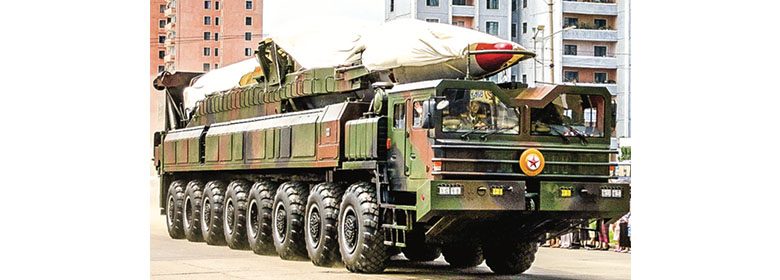Korean agitator

US response to threat of agression from North Korea
Fight or Flight are the two responses to stress brought on by a threat, but there is a third option – patience – that people rarely consider and could bring a more effective end result.
On Sept. 3, the North Korean government, led by Kim Jong-un, successfully detonated a hydrogen bomb underground.
The bomb triggered a magnitude 6.3 earthquake and was the sixth and most potent nuclear test North Korea has conducted.
Many U.S. leaders were quick to comment on this alarming new development and express their concern with North Korea’s disregard for peace.
“Their words and actions continue to be very hostile and dangerous to the United States,” President Donald Trump tweeted that morning.
This test seems to be in response to increased tensions between the United States and North Korea.
North Korea’s dictatorship and communist government has been an agitator in the region since the end of the Korean War, and their continued aggressiveness may be seen as a threat to international peace.
“Kim Jong-un is begging for war,” U.N.
Ambassador Nikki Haley said at an emergency U.N. meeting on Monday, Sept. 4.
However, some world leaders believe the tighter sanctions and thinly veiled remarks made by U.S. leaders is inciting North Korea to become more antagonistic.
“In the situation, pressing on military hysteria will not bring anything. This may end up in a global catastrophe and huge amount of human life lost,” Russian President Vladimir Putin warned on a visit to China.
However, the United States military is mainly concerned with threats to allies like South Korea and Guam.
A direct strike against either one would mean open war.
“Any threat to the United States or its territories, including Guam, or our allies will be met with a massive military response, a response both effective and overwhelming,” US Defense Secretary James Mattis said at a press meeting on Sunday, Sept. 3.
I believe that the United States strategy against North Korea should not change until a direct attack occurs.
Being aware there is a threat is beneficial, but I do not believe that taking an aggressive approach to the issue is the right way to handle the situation.
“We are not looking to the total annihilation of a country, namely North Korea, but as I said, we have many options to do so,” Mattis said.
It is no secret that the U.S. has a very powerful and successful military, and I believe there is no reason for the United States to be on the offensive.
North Korea understands the gravity of their actions and our nation’s leaders have done their job by warning them of them consequences.
I do believe that the best decision is to stay patient and continue to watch the situation closely.
Allowing North Korea to continue to make the decisions is not a sign of weakness, but shows that our military is not afraid of any attack they are planning.
Only time will tell whether or not they will heed the warning stated by U.S. leaders.
Jones is an opinion writer.

Totally agree with your analysis here Jones, patience is likely the best play at this time. Why continually escalate an already volatile, potentially disastrous conflict? Seems like the wise play would be to wait and see how things pan out while refraining from adding fuel to the fire. One response demands another and it goes back and forth until we’re what, engulfed in violent conflict?